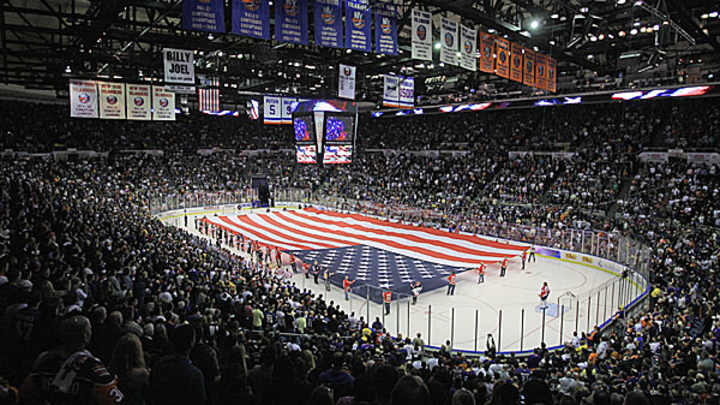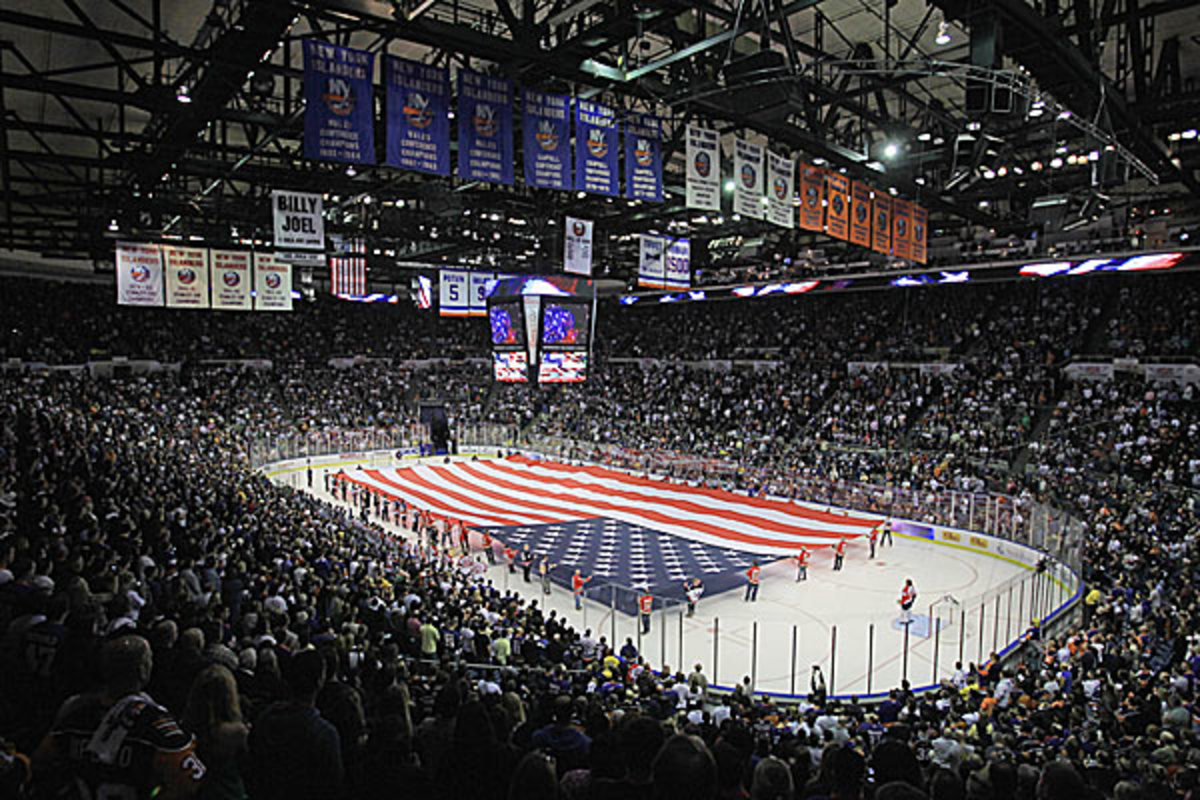The Brooklyn Islanders? Not likely.

Nassau Coliseum is decrepit, but Isles fans may not be keen about going to Brooklyn to see their team. (Bruce Bennett/Getty Images)

By Stu Hackel
So here we go again. Islanders owner Charles Wang, still unable to get any movement in Nassau County on a new arena, has decided to have his team host a preseason game in a large arena elsewhere, one that does not already house an NHL club. The obvious implication is that if he can't get a deal to his liking on Long Island, he's got options. Look out Long Island -- Charles Wang is moving his team.
Well, he's done this before with Kansas City. This time he's doing it with Brooklyn. But, like the Kansas City ploy -- where the game drew only 9,792 people, thus cooling any ardor Wang may have had for relocating there -- this Brooklyn gambit is likely more of a charade than a bona fide threat.
It's not because the Islanders-Devils game on Oct. 2 won't draw well. It probably will. It's just that the new Barclays Center, a state of the art arena designed for the NBA's New Jersey Nets (who, quite ironically, enjoyed their greatest success as the ABA's New York Nets while playing in Nassau Coliseum when it was new), is truly not a viable option for the Islanders.
Why not? For one thing, it moves the Isles into the territory of another team: the Rangers. All NHL franchises have defined territories that are exclusively theirs to exploit for business purposes. And while a certain overlap exists among the three New York City metropolitan area teams, Brooklyn is, as far as is known, still Rangers territory.
Now, this has been a point of contention for some who have stated that the NHL changed the territories to give the Islanders all of geographic Long Island, which includes the western portion comprised of the two New York City boroughs of Brooklyn and Queens. But when NHL Commissioner Gary Bettman was asked about this in an October radio interview (audio) in connection with reports that the Islanders might move to Queens, he said he wasn’t positive that they could do it without the Rangers’ consent, “but nobody’s gotten to that point of even discussing it.” That would apply to Brooklyn as well.
This lawyerly response, even taken at face value, indicates that the territorial boundaries have not changed and would probably require a negotiation. Would the Rangers actually give their consent? My guess is not without a very substantial payment by Wang, and maybe not even then.
What the response might also indicate is that Bettman knows the Rangers would object strenuously to a rival moving to a building that is only 5-1/2 miles from Madison Square Garden (Nassau Coliseum is 25 miles away), but he's willing to play along if it helps Wang gain some leverage with the Nassau County government.
Here's another reason Brooklyn makes little sense: The Islanders already have an established fan base in Nassau and Suffolk Counties. These are relatively affluent areas, especially compared to working class Brooklyn. Now, we're all for arenas in working class neighborhoods and maybe Brooklynites would flock to see the Islanders, but maybe not. Research shows that hockey's demographics in the U.S. generally skew toward wealthier patrons. That would leave the team hoping that its established fans would make the trip west to Brooklyn and continue their support of the club.
There's good reason to suspect that's how the Islanders are thinking now because in their press release announcing the preseason game against the Devils, GM Garth Snow is quoted as saying, “We already have some of the most passionate fans in the league supporting our young team, and we are looking forward to expanding our base into Brooklyn.” That's our emphasis, not Garth Snow's.
And Barclays Center CEO Brett Yormark says, “We feel Brooklyn is an untapped hockey market that offers the Islanders with an exciting opportunity to grow its fan base. Barclays Center will also afford current Islander fans with great accessibility, as the Long Island Rail Road and nine subway lines will come directly to the arena at the Atlantic Terminal transit hub.”
Sounds like they want to keep the fans they already have, doesn't it? At least so they can make this one game a good payday for everyone.
Well, let's look at the Phoenix Coyotes' problems in connection with this. They had an established fan base among their area's population centered in the affluent East Valley and were trying to build an arena in the heart of that area, Scottsdale. Their owner couldn't reach an agreement with the city's government, so in a supreme act of hubris, he told them to buzz off and he'd move his team to Glendale, the other side of the metropolitan area, which is not as affluent (although it has ambitions) and is at least a 40 minute drive from where the Coyotes' fan base was located.
That's worked out quite well, hasn't it? The fans didn't follow the team and you undoubtedly know the rest of the story. True, there is no real mass transportation to Glendale while there is to Brooklyn from Long Island, but so what? That's no guarantee that Islanders fans will make the journey, especially if they like their team conveniently located as it is now and identify it as their region's own but the team then leaves the region. Trains and such are hardly a panacea when it comes to bringing far-flung fans to NHL hockey. There's all sorts of mass transportation options to bring them almost right to the front door of the Devils' new home in Newark, but the team is hardly packing the Prudential Center.
Most importantly, however, the Barclays Center seats only 14,500 people at most for hockey. That would make it the smallest arena in the NHL (as well as the most oddly configured because, as The New York Times reported, the seats in one end must be collapsed to fit the entire ice surface into the building. That means fans will surround only three-quarters of the rink. And let's not forget the Islanders would not be the owners in Brooklyn, but tenants. They'd have to rent the arena, and who knows how much they'd end up making off each ticket, the 100 luxury suites, the four bars/lounges, the three clubs, and the restaurant?
The hockey business flourishes most wherever a franchise owns its building, and the economics of NHL teams are such that, even selling out the entire season would make the Brooklyn Islanders' margins paper-thin at best. The club's resources would be stretched when it came to spending on players. Lesser talent means fewer wins and the Islanders could be no better off than they've been for the last few years -- except they'd be losing in a state of the art building instead of an obsolete one with great sight lines.
The Islanders must know all this. Charles Wang didn't make his billions not understanding business. Unfortunately for him, the people who he's trying to poke and prod on Long Island probably know it, too.
No one wants this team to move. Wang wants the team on Long Island, Bettman wants the team on Long Island, the fans want it on Long Island, and the elected and sub rosa powers in the region probably want to keep it there too. They just can't figure out where to put it and how to split up the costs and the earnings. This little sojourn to Brooklyn is Charles' way of reminding everyone that he'd like some action.
The problem is that nobody in this little drama has to do much of anything just yet with the Isles legally bound to Nassau Coliseum for another three full seasons after this one. Maybe they'll never figure it out and the new Colisee in Quebec or some other arena someplace will be sitting ready for them.
Or maybe if an agreement finally comes about, but the new building on Long Island can't be finished in time for the 2015-16 season, the Isles could find themselves temporarily in Brooklyn. But as a permanent home, it just doesn't make sense.
COMMENTING GUIDELINES: We encourage engaging, diverse and meaningful commentary and hope you will join the discussion. We also encourage, but do not require, that you use your real name. Please keep comments on-topic and relevant to the original post. To foster healthy discussion, we will review all comments BEFORE they are posted. We expect a basic level of civility toward each other and the subjects of this blog . Disagreements are fine, but mutual respect is a must. Comments will not be approved if they contain profanity (including the use of punctuation marks instead of letters); any abusive language or personal attacks including insults, threats, harassment, libel and slander; hateful, racist, sexist, religious or ethnically offensive language; or efforts to promote commercial products or solicitations of any kind, including links that drive traffic to your own website. Flagrant or repeat offenders run the risk of being banned from commenting.
